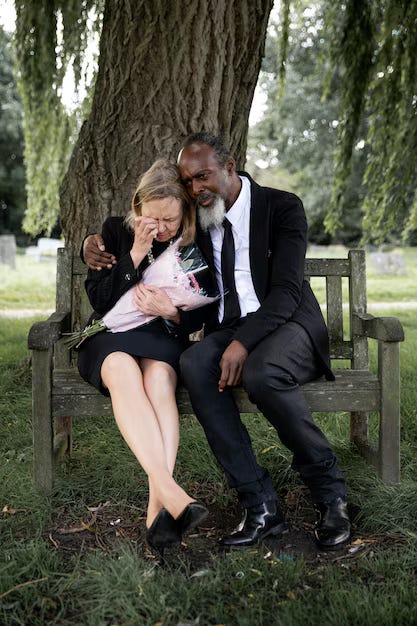I’ve been experimenting with some brief reflections on the readings from the Church’s liturgical year using a perspective drawn from the Irish Benedictine, Don Columba Marmion (1858-1923). This centers in encountering the Mystery of Christ—a way of referring to God’s whole plan of salvation centered in him—in the liturgy of the Church, considered broadly. Given my emphasis in this substack on a retrieval of the “integral and solidary humanism” of Catholic Social Doctrine to inform an authentically Catholic response to the frightening signs of our times, the insight that guided Marmion’s entry into the seminary is noteworthy. It was “that a man’s love for God is measured by his love for his neighbor.”
Today I was touched by the canticle from today’s “morning prayer” in Liturgy of the Hours, and by the first reading of today’s Eucharistic Liturgy from the book of Sirach.
When I first stumbled upon the liturgy of the hours in my early twenties after what I call my first initial adult season of conversion, I mentioned to the reputedly prayerful and recognizably joyful pastor of St. Catherine of Siena Paris in Wilmington, DE that I had just discovered the breviary and I still remember his delight. Fr. Ralph Martin, who would come to be a dear friend, said something along these lines. “Bill, that is wonderful that you are now praying with the whole Church throughout the day! Remember, when you open it, you are using Jesus’s prayerbook. Just think, he grew up sing the Psalms with the people of Israel.” Although I was just beginning to dabble in this prayer—as I’m sure he realized—these words of encouragement from a beloved and revered priest inspired me to better appreciate this treasure of the Church.
Jeremiah’s Canticle of Lament (Jer 14:17-21)
The canticle that struck me this morning was one I have come to memorize and recite frequently in recent years from the Prophet Jeremiah 14:17-21. It is a lament of the people in war and famine. It reads:
Let my eyes stream with tears
day and night, without rest,
over the great destruction
which overwhelms the virgin daughter of my people,
over her incurable wound.
If I walk out into the field,
look those slain by the sword;
if I enter the city, look those consumed by hunger.
Even the prophet and the priest forage in the land they know not.
Have you cast Judah off completely?
Is Zion loathsome to you?
Why have you struck us a blow that cannot be healed?
We wait for peace, to know avail;
for a time of healing, but terror comes instead.
We recognize, O Lord our wickedness, the guilt of our fathers;
that we have sinned against you.
For your name’s sake spurn us not, disgrace not the throne of your glory;
remember your covenant with us and break it not.
[Roman siege of Jerusalem (Image: wallpaperaccess.com)]
Having spent the last quarter century teaching in Catholic seminaries and universities, following my formation as an enthusiastic “JPII” Catholic at what were considered some of the most “conservative” institutions in which the predominant political leaning was “Reagan Republican” with a focus on the issue of abortion, this canticle has increasingly—in recent years—expressed my prayers. It has done so as I have watched too much of the Catholic Church in the United States—especially what I call the “institutional infrastructure” of clergy, academics, media personnel, and influencers—increasingly align with the political right. Largely unaware of the persuasive power of the network of well-funded think tanks and media outlets, many Catholics have continued to drift to the illiberal right even as this right accelerates down a radical path.
Even the most cursory understanding of history tells us this a path that will have many eyes “streaming day and night without rest” over the great destruction many seem doomed to suffer. This is already being felt by millions who depended on USAID, by the most vulnerable at the border, and by tens of thousands of public servants. It may soon be felt by millions of the most vulnerable Americans on Medicaid, with many more to follow.
Sirach 6:5-17
The Old Testament reading from the Book of Sirach, on the other hand, offers an insightful teaching on perennial theme of friendship, a reality that is an earthly foreshadowing of and participation in the charity that is the distinguishing characteristic of authentic Christian doctrine and action. The text reads as follows:
A kind mouth multiplies friends and appeases enemies,
and gracious lips prompt friendly greetings.
Let your acquaintances be many,
but one in a thousand your confidant.
When you gain a friend, first test him,
and be not too ready to trust him.
For one sort is a friend when it suits him,
but he will not be with you in time of distress.
Another is a friend who becomes an enemy,
and tells of the quarrel to your shame.
Another is a friend, a boon companion,
who will not be with you when sorrow comes.
When things go well, he is your other self,
and lords it over your servants;
But if you are brought low, he turns against you
and avoids meeting you.
Keep away from your enemies;
be on your guard with your friends.
A faithful friend is a sturdy shelter;
he who finds one finds a treasure.
A faithful friend is beyond price,
no sum can balance his worth.
A faithful friend is a life-saving remedy,
such as he who fears God finds;
For he who fears God behaves accordingly,
and his friend will be like himself.
[Image from Freepic]
I was blessed today to hear an excellent homily based on this text from a wise priest. He unpacked how the text distinguishes the different relationships that are friendships of a sort, which require discernment on our part. The range of these relationships include what we might call fickle friends, drinking buddies, and friends who betray us. On the other hand, they include friends in an authentic sense, those who provide a sturdy shelter for us, who are a treasure beyond price, and who are a life-saving remedy. Tragically, some today have no true friends who can be sturdy shelters, treasures, and life-saving remedies for them. Many are fortunate to have one. Those who come to the Eucharist liturgy do so to encounter Jesus, who is the most sturdy shelter, the greatest treasure, and the life-saving remedy.
In chapter 15 of John’s Gospel (15:12-17), Jesus calls us his friends, reveals to us the Father’s love by laying down his life for us, and commands us to love one another as he has loved us, so we might enter into and communicate the mystery of divine friendship. The text reads as follows.
This is my commandment, that you love one another as I have loved you. Greater love has no man than this, that a man lay down his life for his friends.
You are my friends if you do what I command you.
No longer do I call you servants, for the servant does not know what his master is doing; but I have called you friends, for all that I have heard from my Father I have made known to you.
You did not choose me, but I chose you and appointed you that you should go and bear fruit and that your fruit should abide; so that whatever you ask the Father in my name, he may give it to you. This I command you, to love one another.
The Gospel reading from today’s mass (Mk 10:1-12) contains one of Jesus’s “hard sayings,” namely his teaching against divorce.
I think today’s paring of this Gospel with the reading from Sirach on friendship offers us another way to enter into the mystery of Christ as we meet it in this challenging text. Today’s liturgical setting encourages us to ponder God’s institution of marriage under the aspect of friendship. It is an invitation to become for each other not merely a fickle friend or drinking buddy who is “in it” as long as “the good times roll,” or even a traitor who betrays the marriage vows. Instead, it is an opportunity to look at marriage as an invitation to be for each other a sturdy shelter, a treasure, and a life-saving remedy, together as friends of Jesus, laying down their lives in the mystery of divine, redemptive love. To the extent that two people are truly doing that, seeing themselves as joined together by God in one flesh, Jesus’s words about divorce become more intelligible. When, however, in this “valley of tears” (Ps 84:6) it happens, the divine friendship remains available for help and healing.
[Image Freepic]







